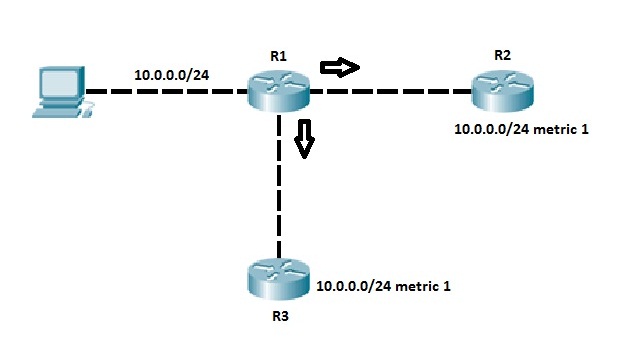RIP in networking is not explicitly listed in the latest 200-301 version of the CCNA exam topics (whereas OSPF is) but you can still be tested on it in the exam.
The Interior Gateway Protocol (IGP), Routing Information Protocol (RIP), is a distance vector routing protocol. It is usually used on small networks because it is very simple to configure and maintain but lacks some advanced features of other routing protocols like OSPF or EIGRP.
RIP Versions
Two versions of RIP in networking exist, version 1 and version 2. Both versions are distance vector routing protocols and they use the number of hops or hop count as a routing metric. Both have an administrative distance of 120 as well.
RIPv2 is a classless routing protocol and it is capable of advertising subnet mask information and uses multicast to send routing updates.
RIPv1 is a classful routing protocol so it doesn’t advertise subnet masks and uses broadcast for updates. Version 2 is backwards compatible with version 1.
RIPv2 sends the entire routing table every 30 seconds, which can consume a lot of bandwidth, leading to slow convergence. RIPv2 also uses the multicast address of 224.0.0.9 to send routing updates, reducing network traffic and it supports authentication and triggered updates (updates that are sent when a change in the network occurs).
RIP Example
For an example of how RIP protocol works, consider the following figure.
Router R1 directly connects to the subnet 10.0.0.0/24. The network engineer has configured RIP on R1 to advertise the route to this subnet. R1 sends routing updates to R2 and R3. The routing updates list the subnet, subnet mask and metric for this route. Each router, R2 and R3, receives this update and adds the route to their respective routing tables. Both routers list the metric of 1 because the network is only one hop away.
The maximum hop count for a RIP route is 15. Any route with a higher hop count is considered to be unreachable, preventing routing loops.
Download our Free CCNA Study Guide PDF for complete notes on all the CCNA 200-301 exam topics in one book.
We recommend the Cisco CCNA Gold Bootcamp as your main CCNA training course. It’s the highest rated Cisco course online with an average rating of 4.8 from over 30,000 public reviews and is the gold standard in CCNA training:

